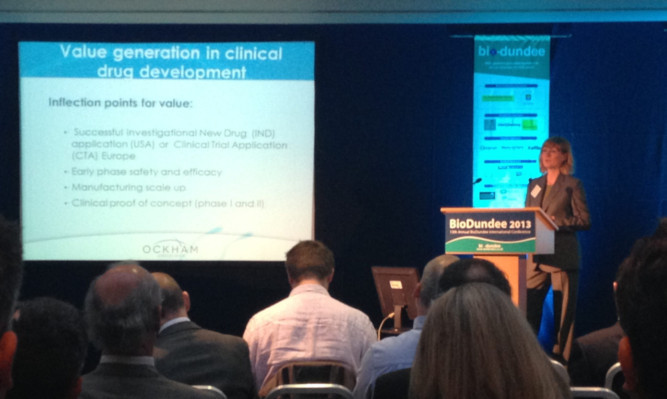Turmoil in the economics of the pharmaceutical industry could improve the chances for well-supported biotech firms to reap the rewards of their research, a Dundee conference has heard.
But speaker Neil Murray warned the 13th annual BioDundee event that the “Valley of Death” between the discovery and commercial use of IP in the life sciences sector continued to widen as large drug firms are buffeted by the difficulties in their markets.
The chief executive of Liverpool’s Redx Pharma said increasing sales of unbranded generic medicines had put the squeeze on big pharma’s branded revenues, leaving multinationals hesitant to pick up the estimated $1 billion cost of getting each new treatment into production.
Meanwhile, the biotech and academic sectors are ill-equipped to tackle the research and development process alone.
“A market that says ‘Whoever is the fittest, let them survive’ doesn’t work,” Dr Murray, who studied at Dundee University, said. “It doesn’t work for the industry, and it doesn’t work in terms of providing products for patients.
“What it has resulted in, in areas such as antibacterials and infectious disease, is a huge dearth of new products coming through, where they are simply not considered economic enough and companies have not been investing in those specific areas.
“But all of this points to the fact that there is an opportunity for a new model and I actually think that this is good news, not bad news. The industry as a whole is ripe for change it has to find new ways of doing things.”
Dr Murray who also founded bioscience business development company Essential Sciences and scar reduction firm PharmEcosse, based in Edzell said the industry’s challenges could be turned into opportunities by early-stage intervention.
He said Redx had managed to use its own specialist development platform and expertise to develop a pipeline of early-stage opportunities, with large pharmaceutical firms as potential end-point customers following successful development.
The firm was looking to new collaborative agreements with outside parties, including healthcare providers and venture capitalists, Dr Murray added.
More than 60% of the 100-plus delegates at this year’s BioDundee conference the largest life sciences exchange in Scotland were from outside the city’s own cluster.
They included an Austrian embassy representative keen to explore trading and collaboration chances in Scotland and the deputy director of discovery and translational services at the Bill and Melinda Gates Foundation, Dr Ken Duncan.
He spoke about the importance of partnerships in drug discovery and development for the developing world, while another session focussed on the cross-over opportunities between life sciences, data management and Dundee’s digital sector.
BioDundee’s Allison Beattie said: “We’re seeking to bring people into the sector and explain to them the wealth of opportunities in Dundee and potential collaborations which exist here.”
The programme, which also featured a gala dinner hosted by Dundee University principal Professor Pete Downes last night, continues today with a string of visits to key city sites, including the university’s Drug Discovery Unit and Institute for Medical Science and Technology, and the James Hutton Institute at Invergowrie.
